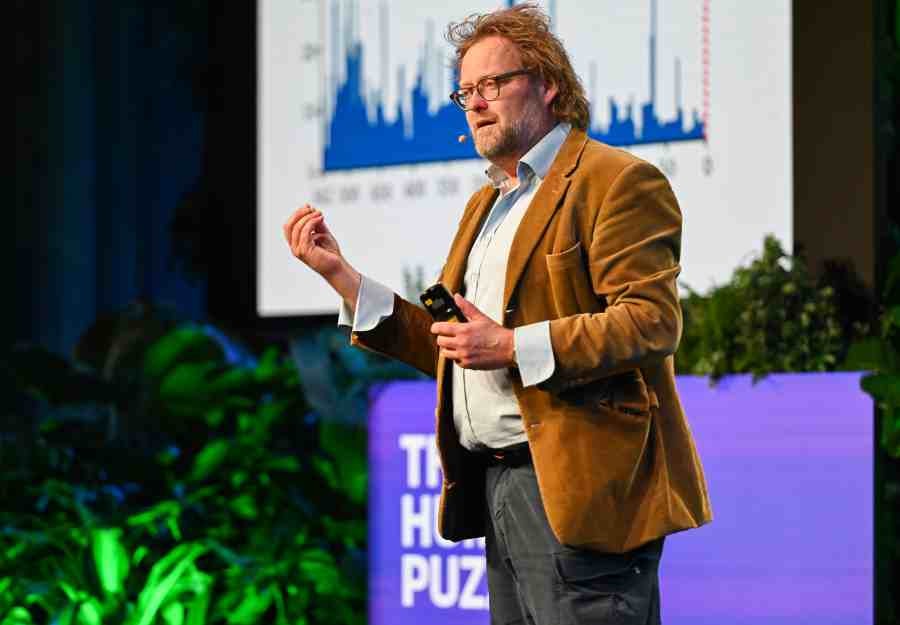“Anyone who claims to know what’s coming in the global economy is probably lying” — Interview with Dávid Barrett Tamás, Oxford behavioral researcher

You were a student in the early ’90s. What memories do you have of Corvinus back then?
The truth is, I was a very good boy back then, so I don’t have many exciting stories from those times. I had a girlfriend I was deeply in love with, so I didn’t drink or party; I just rushed home to her after classes. I studied mathematical economics and international relations, and I took every possible course I could. Because of this, I had some schedule conflicts and couldn’t always attend every class. I had a favorite philosophy class, which I could only attend occasionally. Because of that, some classmates started spreading rumors that I was sent by the administration as a spy. I remember that really hurt me at the time.
Through your Corvinus professors, you connected with Vilmos Csányi, the ethologist, who mentored you regularly for years and played a key role in your decision to become a researcher. Why did you want to meet him?
Originally, I was planning to visit Konrad Lorenz. I had a question to ask him. Economics is based on the assumption that everyone always wants more, and that drives the economy. I was very interested in what lies behind this and wanted to ask a mathematician, a biologist, and an ethologist about it. At Corvinus, I had a philosophy of religion professor who I knew had good academic connections. I fibbed to him that I had arranged to visit Konrad Lorenz but didn’t have his address. He replied that he’d help me get it — but unfortunately, Konrad Lorenz had died three years earlier. “But here’s the phone number of the Hungarian Konrad Lorenz.” That’s how, at 21, I ended up with Vilmos Csányi, whom I visited once a week for three years, cooking and walking the dog together in between. Nowadays I know this was what’s called a tutorial system. He was the most influential mind shaping my thinking and scientific career.
How did your path lead from Corvinus to Cambridge?
One day I got a call from the rector’s office saying there was an English gentleman who wanted to talk to some students. We went for a walk with him, and at the end, he pointed at some of us and told us to apply to Cambridge. Later I found out he was funded by London’s City Bank to bring talented students from post-Soviet countries to the UK on scholarships. That’s how I ended up at Cambridge, where I studied applied economics for two years, focusing mainly on macroeconomics. When I graduated, I wanted to see how all this works in practice.
That’s when you founded your research consultancy specializing in developing economies. Your international team monitored changes in 35 countries in the early 2000s and advised several governments. In 2005, you predicted the upcoming global crisis but were not believed. What turns do you expect in the world economy now?
The early 2000s were different in some ways. Certain patterns very clearly predicted a huge crisis was coming. The uncertainty factor was that we couldn’t say in advance how people would behave under different scenarios. Actually, this uncertainty factor pushed me from practical economics toward evolutionary behavioral research.
Now, however, opposing forces are at work simultaneously. Trump’s decisions are shaking the world economy, increasing uncertainty, which usually leads to crises globally. In the background, though, there is the fastest acceleration in human history — the rise of artificial intelligence. For the first time in Earth’s 4.2-billion-year history, this intelligence is not human or biologically based but machine-based, whose future effects are also unpredictable. So, in my opinion, no one can say for sure what’s coming.
How did your path lead from applied economics to evolutionary behavioral research?
Because of my close connection to Vilmos Csányi, behavioral research was always my main interest, but early in my career, I focused more on the economic development of countries. Around 2008, I worked for a few months in Papua New Guinea on a World Bank project, where as an economist I had to consider problems like how to prevent the collapse of the country’s ecological and cultural system. That was a huge experience for me, and it felt like it flipped a switch inside me, awakening my anthropologist self. By then, my family and I lived in Oxford, and I started attending anthropology lectures there.
You still teach economics students at Oxford’s Trinity College. Do you consider yourself more an economist or a behavioral researcher?
Oxford is one of Europe’s strongest universities, very hard to get into — only the very best succeed. On their first day, these bright-eyed students — the future hopes of economics — sit waiting for someone to tell them the truth. Instead, they get me, who on the first day plans a kind of terrorist attack against them. I usually ask them to write a 1,500-word essay by the next week about what would happen to the economy if the gift culture of Burning Man festivals spread worldwide. I’m ruthless like that. I like to teach by first blowing apart the supposedly eternal truths of economics, then rebuilding everything together. If you ask my former students about me, some remember me as an economist, others as a mathematician or anthropologist. I don’t draw sharp boundaries myself; I research problems rather than disciplines.
Why did the topic of patriarchy interest you enough to write a book about it?
Without exception, every culture has rules applying exclusively to women that differ from those applying to men. These rules vary across cultures and historical periods — in space and time — and it’s very well definable which rules govern family and society functioning in which culture. For me, this was a fascinating scientific question screaming for deeper investigation.
Interview by Veronika Szandtner